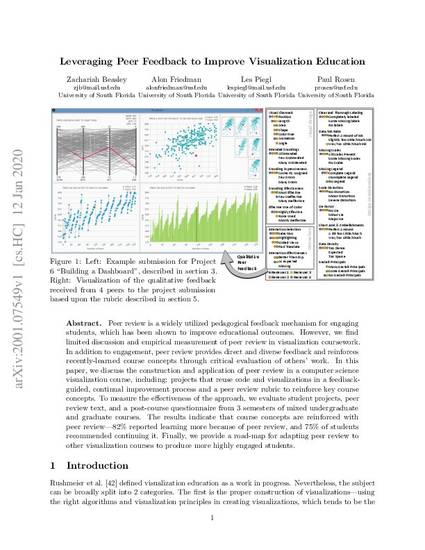
Article
Leveraging Peer Feedback to Improve Visualization Education.pdf
arXiv
(2020)
Abstract
Peer review is a widely utilized pedagogical feedback mechanism for engaging students, which has been shown to improve educational outcomes. However, we find limited discussion and empirical measurement of peer review in visualization coursework. In addition to engagement, peer review provides direct and diverse feedback and reinforces recently-learned course concepts through critical evaluation of others' work. In this paper, we discuss the construction and application of peer review in a computer science visualization course, including: projects that reuse code and visualizations in a feedback-guided, continual improvement process and a peer review rubric to reinforce key course concepts. To measure the effectiveness of the approach, we evaluate student projects, peer review text, and a post-course questionnaire from 3 semesters of mixed undergraduate and graduate courses. The results indicate that course concepts are reinforced with peer review---82% reported learning more because of peer review, and 75% of students recommended continuing it. Finally, we provide a road-map for adapting peer review to other visualization courses to produce more highly engaged students.
Keywords
- Visual peer review,
- visualization education,
- visual rubric,
- students comments
Disciplines
Publication Date
Fall January 8, 2020
DOI
arXiv:2001.07549
Publisher Statement
arXiv® is a free distribution service and an open archive for scholarly articles in the fields of physics, mathematics, computer science, quantitative biology, quantitative finance, statistics, electrical engineering and systems science, and economics. arXiv is a collaboratively funded, community-supported resource founded by Paul Ginsparg in 1991 and maintained and operated by Cornell University.
Citation Information
2020arXiv200107549B
